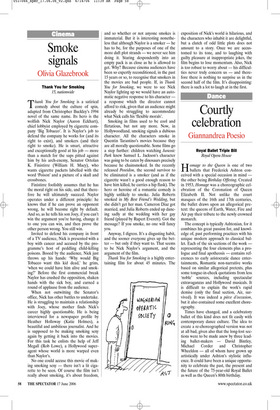Smoke signals
Olivia Glazebrook
Thank You for Smoking 15, nationwide Thank You for Smoking is a satirical comedy about the culture of spin, adapted from Christopher Buckley’s 1994 novel of the same name. Its hero is the wolfish Nick Naylor (Aaron Eckhart), chief lobbyist employed by cigarette company ‘Big Tobacco’. It is Naylor’s job to defend the company he works for (and its right to exist), and smokers (and their right to smoke). He is smart, attractive and exceptionally good at his job — more than a match for the saps pitted against him by his arch-enemy, Senator Ortolan K. Finistirre (William H. Macy), who wants cigarette packets labelled with the word ‘Poison’ and a picture of a skull and crossbones.
Finistirre foolishly assumes that he has the moral right on his side, and that therefore he will ultimately succeed. Naylor operates under a different principle: he knows that if he can prove an opponent wrong, he will become right by default. And so, as he tells his son Joey, if you can’t win the argument you’re having, change it to one you can win, and then prove the other person wrong. You still win.
Invited to defend his company in front of a TV audience, Nick is presented with a boy with cancer and accused by the programme’s host of peddling child-killing poisons. Booed by the audience, Nick just throws up his hands: ‘Why would Big Tobacco want this kid dead,’ he grins, ‘when we could have him alive and smoking?’ Before the first commercial break Naylor has crushed the opposition, shaken hands with the sick boy, and earned a round of applause from the audience.
When not outwitting the Senator’s office, Nick has other battles to undertake. He is struggling to maintain a relationship with Joey, whose mother finds Nick’s career highly questionable. He is being interviewed for a newspaper profile by Heather Holloway (Katie Holmes), a beautiful and ambitious journalist. And he is supposed to be making smoking sexy again by getting it back into the movies. For this task he enlists the help of Jeff Megall (Rob Lowe), a Hollywood superagent whose world is more warped even than Naylor’s.
No one could accuse this movie of making smoking sexy — there isn’t a lit cigarette to be seen. Of course the film isn’t really about smoking, it’s about freedom, and so whether or not anyone smokes is immaterial. But it is interesting nonetheless that although Naylor is a smoker — he has to be, for the purposes of one of the more daft plot strands — we never see him doing it. Staring despondently into an empty pack is as close as he is allowed to get. Why? Because cinema audiences have been so expertly reconditioned, in the past 15 years or so, to recognise that smokers in the movies are bad people. If, in Thank You for Smoking, we were to see Nick Naylor lighting up we would have an automatic negative response to his character a response which the director cannot afford to risk, given that an audience might already be struggling to accommodate what Nick calls his ‘flexible morals’.
Smoking in films used to be cool and flirtatious, but not any more. Now, in Hollywoodland, smoking signals a dubious character. All the characters smoke in Quentin Tarantino’s movies because they are all morally questionable. Some films go a step further: children watching Jurassic Park knew Samuel L. Jackson’s character was going to be eaten by dinosaurs precisely because he chainsmoked. In the recently released Poseidon, the second survivor to be eliminated is a smoker (and as if the cigarette wasn’t a good enough reason to have him killed, he carries a hip flask). The hero or heroine of a romantic comedy is highly unlikely to smoke. Julia Roberts smoked in My Best Friend’s Wedding, but she didn’t get her man. Cameron Diaz got married, and Julia Roberts ended up dancing sadly at the wedding with her gay friend (played by Rupert Everett). Got the message? If you smoke, no one will fancy you.
Anyway, I digress. It’s a disgusting habit, and the sooner everyone gives up the better — but only if they want to. That seems to be Nick Naylor’s argument, and the argument of the film.
Thank You for Smoking is a highly entertaining film for about 45 minutes. The exposition of Nick’s world is hilarious, and the characters who inhabit it are delightful, but a clutch of odd little plots does not amount to a story. Once we are accustomed to its tone, and to laughing with guilty pleasure at inappropriate jokes, the film begins to lose momentum. Also, Nick is too robust to worry about — his difficulties never truly concern us — and therefore there is nothing to surprise us in the second half of the film. It’s disappointing: there is such a lot to laugh at in the first.


















































































 Previous page
Previous page